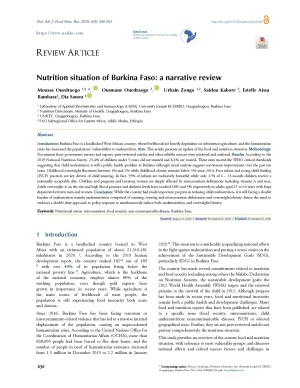Nutrition situation of Burkina Faso: a narrative review
Abstract
Introduction: Burkina Faso is a landlocked West African country, where livelihoods are heavily dependent on subsistence agriculture, and the humanitarian crisis has increased populations vulnerability to malnutrition. Aim: This article presents an update of the food and nutrition situation. Results: According to the 2019 National Nutrition Survey, 25.4% of children under 5 years old are stunted and 8.1% are wasted. These rates exceed the WHO critical thresholds suggesting that child malnutrition is still a public health problem in Burkina although trend analysis suggests continuous improvement over the past ten years. Childhood overweight fluctuates between 1% and 2% while childhood obesity remains below 1% since 2014. Poor infant and young child feeding (IYCF) practices are key drivers of child stunting. In fact, 59% of infants are exclusively breastfed while only 17% of 6 – 23-month children receive a minimally acceptable diet. Children and pregnant and lactating women are deeply affected by micronutrient deficiencies including vitamin A and iron. Adult overweight is on the rise and high blood pressure and diabetes levels have reached 18% and 5% respectively in adults aged 25 to 64 years with huge disparities between men and women. Conclusion: While the country had made important progress in reducing child malnutrition, it is still facing double burden of malnutrition namely undernutrition comprised of stunting, wasting and micronutrient deficiencies and overweight/obesity, hence the need to embrace a double duty approach to policy response to simultaneously reduce both undernutrition and overweight/obesity.
Full text article
Authors
Copyright (c) 2020 Authors

This work is licensed under a Creative Commons Attribution 4.0 International License.
-
Attribution — You must give appropriate credit, provide a link to the license, and indicate if changes were made. You may do so in any reasonable manner, but not in any way that suggests the licensor endorses you or your use.
-
No additional restrictions — You may not apply legal terms or technological measures that legally restrict others from doing anything the license permits.





